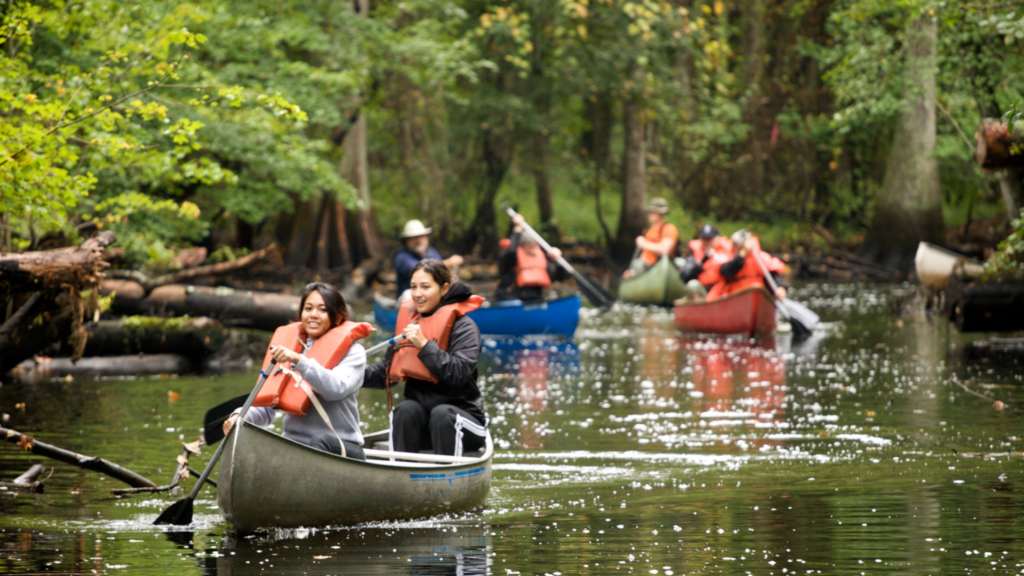
Recently, Diana and I were leading a Making Disciples Institute for the archdioceses of Winnipeg and St. Boniface. We had been advocating, as we always do, that the RCIA teams move their catechumens and candidates out of the “classroom” and into the life of the parish community.
One of the participants asked, “If we do that, what happens if the catechumens and candidates learn something wrong from the parishioners?”
What if we teach the wrong thing?
This is a perfect lead-in to what I wanted to write about this week — our fearful way of knowing. Previously, I wrote about the seekers being afraid and about our own fear as leaders and catechists. These two fears are fed by an underlying fear. Most of us are afraid of either learning or teaching the wrong thing. This doesn’t apply only to faith formation. We approach any learning experience with a near-certainty that there is a pure, correct way of knowing.
Anytime we are learning or teaching something, there are two questions that drive the educational process: How do we know what we know? And how do we verify that what we know is true? We may not even be aware we are asking these questions, but we know they are there by the way we teach and learn.
This is easy to test. Choose a subject other than faith formation. For example, cooking. If you don’t think of yourself as a very good cook, you probably think your mother or your neighbor is a better cook than you. They “know” the right way to cook. And if you go to a fancy restaurant, you can be sure that the chef is an even better cook. He knows more. He probably studied in France. And French cooking is the ultimate “truth” about how food should be prepared. So if you wanted to become a better cook, you might ask your neighbor for some tips. But if you wanted to be sure you were learning the most correct way to cook, you’d look up that French chef on YouTube and copy his instructions for scrambled eggs to the letter.
The truth is out there
Parker Palmer calls this process of knowing objectivism. He says that objectivism “portrays truth as something we can achieve only by disconnecting ourselves, physically and emotionally, from the thing we want to know.”
Why? Because if we get too close to it, the impure contents of our subjective lives will contaminate the thing and our knowledge of it. No matter what “it “ is—an episode in history, a creature from the wild, a passage in great literature, or a phenomenon of human behavior—objectivism claims that we can know the things of the world truly and well only from afar. (The Courage to Teach, 52)
The participant at the institute had this fear. Most of us do. We fear letting the catechumens and candidates have too many subjective experiences of Jesus because then the pure knowledge of who Jesus is will get contaminated. We objectively teach the seekers that the community of believers is the Body of Christ (Catechism of the Catholic Church, 752), while at the same time fearing that if the seekers have an actual, subjective experience of our parishioners, they will get the wrong idea about who Jesus is. If we think about this a bit, we can see that what we are afraid of is that the seekers might develop an actual relationship with Christ.
Are you afraid your parishioners are giving the RCIA seekers the wrong impression?
Palmer says it this way:
So objectivism, driven by fear, keeps us from forging relationships with the things of the world. Its modus operandi is simple: when we distance ourselves from something, it becomes an object; when it becomes an object, it no longer has life; when it is lifeless, it cannot touch or transform us, so our knowledge of the thing remains pure.
For objectivism, any way of knowing that requires subjective involvement between the knower and the known is regarded as primitive, unreliable, and even dangerous. The intuitive is derided as irrational, true feeling is dismissed as sentimental, the imagination is seen as chaotic and unruly, and storytelling is labeled as personal and pointless. (52-53)
The way, the truth, and the life
So how do we know what we know about Jesus, and how do we verify it is true? True human knowing is always relational. It is what makes us different than animals. It is what makes us beings in the image of God. We can only know Jesus by being in relationship with the full mystery of Christ. And we can only verify the truth of that relationship through an immersion in an imaginative, Spirit-filled, story of faith. If we stop at the wall of objectivism, we will end up knowing about Jesus without knowing the person of Jesus.
I am aware of the risks. If we do not control the learning environment, and we set our seekers free into the “wilds” of our parish, who knows what could happen to them. Some could lose their faith. Some could become heretics. But most won’t. If we can let go of our fear and have a little faith in the love that is deeply shared among our parishioners, we don’t have to worry so much about controlling things. Palmer says, “This relational way of knowing—in which love takes away fear and co-creation replaces control—is a way of knowing that can help us reclaim the capacity for connectedness on which good teaching depends” (57-58).
If a “relational way of knowing” doesn’t seem like “real” teaching to you, remember how Jesus taught. He was always focused on relationship. The way that he loved others was his teaching. And that is the teaching we are called on to continue today.
What is your story?
What are you fearful of in regard to your catechetical ministry? What do you do to overcome your fear?


















This article reminds me of a conversation I just had with a pre-inquirer last week. He isn’t sure what he wants, but he’s been around the parish on Sundays because he drives his wife, who has far-advanced MS. He’s very methodical and rational, but toward the end of our conversation, he remembered having gone to the Easter Vigil. His face changed and he said, “It was very moving.” I jumped on that. I said, “Hang onto that memory. What you felt was a sign of the Spirit’s moving in you. When you have those moments, they are encounters with God.” He got a little smile on his face, and it gave me great confidence that he’ll move forward with more than information. He’ll be IN formation.
I have taught RCIA and Faith Formation for 11 years. I was at a 5 day RCIA conference a few years ago. First thing out of the mouths of the professors, RCIA is messy. I have had the privilege to serve under 5 DRE’s. Four of them were above and beyond. One of them seemed bent on getting people to leave the church. Every weekend a retreat, students and parents having to go to church three times a week. All nice, but forgetting, homework, family, work, soccer, and other things that go on in life. There is life outside the church. My main focus, and I know it will not steer me wrong is the Bible. I follow the agenda, but focus on Compassion, Love, Mercy, Forgiveness, Charity, Humility. I could go on all day about doctrine and dogma, but if the students and parents ignore the homeless- person in the street, do not offer to feed or clothe them, go the the shelter, visit the sick……..it is all empty. It is simple really. This one DRE could not stop finding more things to add to make the program richer. The students felt they were in school after a full day of school. The wrong approach. We are called to be fishers of men and women, Be the light to guide them to Christ. Our program for 3 years was one of expectation, insisting on the students and parents knowing everything. So many people left for other parishes. Where they were able to continue the program. Our DRE said, if they are so weak in faith, let them leave. Again, the wrong approach. This is all simple. Love, Compassion, Mercy, but most important, not that we teach it, but that we live, it, that they see a difference, and we teach with fire and passion, believing what we teach.